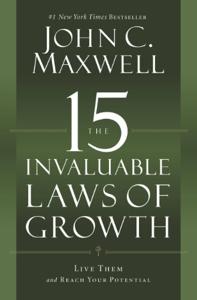
Want to learn the ideas in The 15 Invaluable Laws Of Growth better than ever? Read the world’s #1 book summary of The 15 Invaluable Laws Of Growth by John C. Maxwell here.
Read a brief 1-Page Summary or watch video summaries curated by our expert team. Note: this book guide is not affiliated with or endorsed by the publisher or author, and we always encourage you to purchase and read the full book.
Video Summaries of The 15 Invaluable Laws Of Growth
We’ve scoured the Internet for the very best videos on The 15 Invaluable Laws Of Growth, from high-quality videos summaries to interviews or commentary by John C. Maxwell.
1-Page Summary of The 15 Invaluable Laws Of Growth
Overview
Everyone has experienced the need for personal growth at some point. This is because of major life transitions, new professional challenges, or simply the desire to evolve as a person. To grow, you have to leave your comfort zone and take real risks by dreaming big and working hard every day. Dreaming alone isn’t enough; change happens slowly over time through hard work and dedication.
Here are some strategies that you can use to make progress towards your goals. They’ll help you get through the tough times and keep going even when it seems like nothing’s getting done. The 15 Laws of Growth, a book by John C. Maxwell, has great advice on how to grow as an individual and become successful in life.
This passage talks about three key points. The first is that painful losses can lead to personal growth. The second point is that you should never grow without your community, and the third point is that you need to dream big but also be realistic.
Big Idea #1: Before you begin your journey, you need to know who you are and what you want.
If you want to go somewhere, it’s important to have a map. In the same way, if you want to grow as an individual and reach your full potential, it’s crucial that you know where you’re going. However, for many people this is easier said than done because they don’t always know what their goals are or what they should be doing in order to achieve them.
In order to know what you want, it’s important to get in touch with yourself. That can be challenging for most people, but if you ask yourself the right questions and do some introspection, you’ll figure out what you want.
First of all, ask yourself if you’re happy with your job. If it doesn’t make you feel fulfilled and passionate about what you do each day, then it’s time to find something that will fulfill those needs.
So what will fulfill you? The answer to that question is as unique as your fingerprints; it’s specific to your personality, values, and dreams. To identify the answer, notice yourself when something makes you “light up” or get excited. Think about times in your life where you felt useful and valued by others.
Once you’ve discovered what you want to do, it’s important to stop and think about whether or not it’s possible. If your dream is to be a professional basketball player but you hate exercising and have terrible coordination, then that dream is really just a fantasy. A realistic goal should line up with your talents and capabilities. Once you’re sure that your goal is achievable, the next question becomes: Why do I want to achieve this?
This is important. You need to be honest with yourself about why you want to do a PhD, especially if it’s for the wrong reasons. For example, if you say that you’re passionate about learning but in fact what really drives your decision is impressing other people, then there will likely be trouble down the road.
It’s not bad to want to impress people, but that isn’t necessarily the best motivation for a PhD program. A better reason is doing it because you love what you’re studying and will be happy in the long run with your choice.
Big Idea #2: Personal growth won’t just happen by itself.
Your hair grows by itself. So do plants, given enough water and sunlight. Spiritual growth is different – it doesn’t just happen naturally over time.
Just as plants need light, personal growth requires intention. You have to think carefully about what you want and where you’re headed in order to get there.
Intentions alone are not enough. You have to put them into action by taking action right now, not next month or the day after tomorrow.






